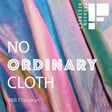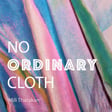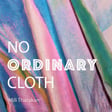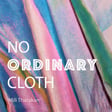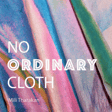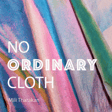
🌱 Ep 20. Ecosystem Builders Transforming Fashion from the Inside Out with Amy Tsang, Georgia Parker and Helen Lax (x Fashion District)
Special episode: No Ordinary Cloth x Fashion District
Guests:
- Amy Tsang, Head of Europe at The Mills Fabrica
- Georgia Parker, Innovation Team at Fashion for Good
- Helen Lax, Director of Fashion District London
This is the 5th in a series of episodes in collaboration with Fashion District - a dynamic hub for fashion innovation in East London, connecting fashion technology, business, and education to support startups with innovation networks, affordable spaces, business guidance, and investment opportunities.
This episode of No Ordinary Cloth podcast features an insightful discussion with three prominent ecosystem builders in the fashion and textile industry: Amy Tsang, Georgia Parker and Helen Lax. They delve into the crucial role of ecosystem partners in driving innovation and sustainability within the industry.
The conversation covers various aspects of supporting startups, including common challenges faced by innovators, such as funding, scaling production, and navigating the complexities of the fashion industry.
The guests highlight the importance of collaboration and alignment among different stakeholders to accelerate the adoption of sustainable solutions. They also stress the need for greater alignment with policymakers to drive meaningful change in the industry.
The episode explores the role of ecosystem builders in supporting startups through various stages of growth, from incubation to scaling. The guests share insights on impact measurement and the importance of founder wellbeing as well.
Looking ahead, the guests envision an even more critical role for ecosystem builders in facilitating industry-wide collaboration, addressing knowledge gaps, and helping stakeholders navigate the complex landscape of innovation and sustainability in fashion and textiles. The episode concludes with personal anecdotes about cherished textile items, highlighting the emotional connections we form with clothing and the potential for long-lasting, quality garments to be passed down through generations.
Key Topics Discussed:
- The role of ecosystem builders in driving innovation in fashion and textiles
- Common challenges faced by startups in the fashion industry
- Programs and support offered by The Mills Fabrica, Fashion for Good, and Fashion District London
- Building successful fashion innovation ecosystems
- Emerging technologies and trends transforming the fashion industry
- The importance of collaboration between ecosystem partners
- Funding and investment opportunities for fashion startups
- Measuring impact and success in fashion innovation
Fashion District London l Fashion District Festival 2025
Mili Tharakan: Linkedin l Insta l Buy me a coffee
Contact me: No Ordinary Cloth
Recommended listening:
Ep 18. Investor Insights for Fashion and Textile Startups
Ep 12. Strategies and Ecosystems for Fashion / Textile Startup Success
Cover art: Photo by Siora, Photography on Unsplash
Music: Inspired Ambient, Orchestraman
